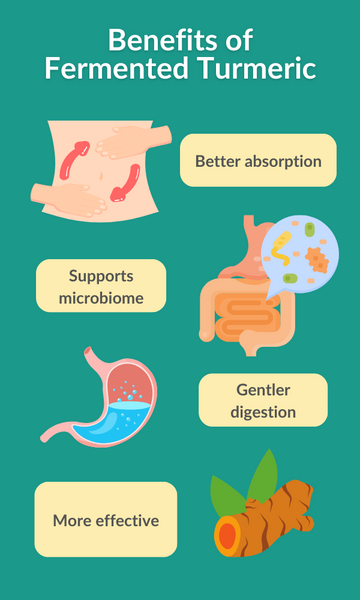What are the Benefits of Fermented Turmeric?

Have you heard of turmeric? Many of us are familiar with this unique plant as a staple of our spice cabinets, tea collections, and even as a powerful part of an anti-inflammatory diet. As turmeric becomes an increasingly popular part of our health and wellness routines, more people are turning to the world of supplements to get their daily dose of this helpful spice. Learn the benefits of fermented turmeric supplements.
What is turmeric?
Turmeric, also known as Curcumin longa, is a flowering plant and common spice native to India and southeast Asia. Prized for its rich golden color, earthy flavor, and numerous health benefits, turmeric has been used in cooking and traditional Ayurvedic medicine for hundreds of years. But what makes this plant so special?
As a spice and supplement, turmeric is derived from the rhizome, or root, of the turmeric plant. In its raw form, turmeric root looks a lot like ginger–in fact, turmeric is a member of the ginger family!
Like ginger, turmeric has powerful antioxidant and anti-inflammatory properties. This is due to turmeric’s high curcumin content.
Curcumin is the active compound that gives turmeric its bright yellow color. It is one of three particularly powerful antioxidants unique to turmeric that are known as curcuminoids.
Turmeric supplement uses
Thanks to its powerful antioxidant and anti-inflammatory properties, turmeric supplements have a number of uses including:
Reducing inflammation
Chronic inflammation and oxidative stress can lead to a number of health issues including joint pain, low energy, muscle cramps, lowered immune function, poor sleep, and more. Antioxidants like the curcumin found in turmeric help fight inflammation by neutralizing the free radicals that cause it.
Lower risk of chronic illness
Oxidative stress, inflammation, and free radical damage are positively associated with a number of chronic illnesses including cancer, diabetes, and Alzheimer’s. Chronic inflammation is also a contributing factor in the development of heart disease, the leading cause of death in the United States according to the CDC. A healthy diet rich in fruits and vegetables and regular consumption of antioxidant-rich compounds like turmeric can help.
Supports joint health and cartilage
As we age, the soft tissue between our bones, called cartilage, begins to wear down. Over time, cartilage loss and damage in our joints can lead to stiffness, pain, and increased risk of damage. Turmeric helps preserve and heal cartilage by inhibiting the enzymes that break it down and supporting the bone marrow cells as they grow more.
Improve digestion and support healthy microbiome
Worried about leaky gut? Poor nutrition, unhealthy lifestyle choices, and other factors can lead to poor microbiome diversity and chronic inflammation in our GI tract. Luckily, turmeric can help. Studies show that regular intake of curcumin helps to shift the bacteria populations in our microbiome toward a healthier composition. Curcumin also helps restore our natural gut barrier and soothe chronic inflammation in the GI tract.
Not all turmeric supplements are created equal
With all the hype about the benefits of supplementing turmeric, it’s not surprising that more supplement brands are choosing to add turmeric to their product lines. However, it’s important to remember that when choosing a supplement, quality is a top concern.
Not only are poor-quality supplements less effective–they can contain toxic heavy metals and other contaminants that can actually make you sick. To get the most out of your turmeric supplement, we recommend choosing a brand that is both 100% organic and fermented.
What is fermented turmeric?
Fermentation is a naturally-occurring process during which healthy bacteria and microorganisms break down a food. Fermented foods and supplements are often easier for the body to process and absorb since the good bacteria have already done some of the digestion for you. In addition, fermented supplements have the added benefit of supporting the diversity of good bacteria in our gut’s microbiome.
Fermented turmeric is exactly what it sounds like: turmeric powder that has been fermented with healthy bacteria as part of the manufacturing process. This can be especially helpful since turmeric and curcumin are notoriously difficult for the body to absorb.
Benefits of fermented turmeric powder

Fermented turmeric powder is:
- Easier for the body to process and absorb
- Enhanced with healthy bacteria to help support the gut’s microbiome
- Gentler on the digestive tract
- Increased antioxidant activity over non-fermented turmeric
Where can I buy fermented turmeric powder?
We recommend Dr. Eric Snow’s Turmeric Power, a 100% organic, fermented turmeric powder. Not only is Turmeric Power manufactured according to rigorous, scientifically-backed standards, it uses a proven fermentation process to make sure you get the full benefit of turmeric. You can buy it here in our Shop.
Frequently asked questions about fermented turmeric powder
Does fermented turmeric powder support gut health?
Yes, the fermentation process adds healthy bacteria to the turmeric which the body incorporates into the gut’s microbiome during digestion. Fermentation also makes it easier for the body to absorb and use turmeric, enhancing its natural ability to support digestion.
What are common turmeric side effects?
Common side effects of turmeric supplements may include:
- Upset stomach
- Diarrhea
- Rashes
- Headaches
- Bloating
- Flatulence
- Acid reflux
- Nausea
Should I take turmeric supplements?
While turmeric is generally well-tolerated, turmeric supplementation in large doses may cause you to bleed more easily and is not recommended for individuals who take blood-thinning medications such as Warfarin.
If pregnant or nursing, please consult a healthcare professional.
Does turmeric powder stain?
Due to its high concentration of inflammation-fighting curcuminoids, turmeric has a distinctive yellow-gold color. Historically, it was often valued for its color and was often used to dye clothing.
Unfortunately, this means that turmeric powder can stain. Depending on where the stain is located, you can use several methods to get it out.



